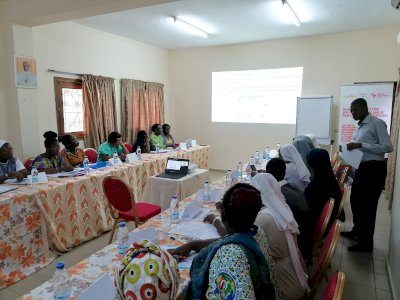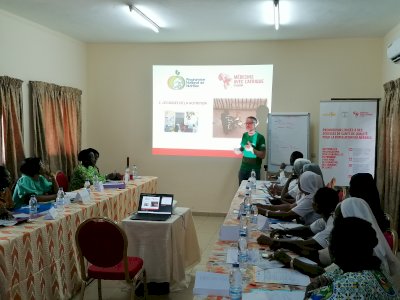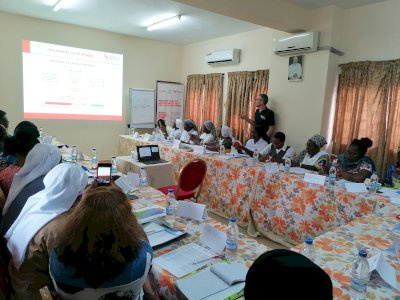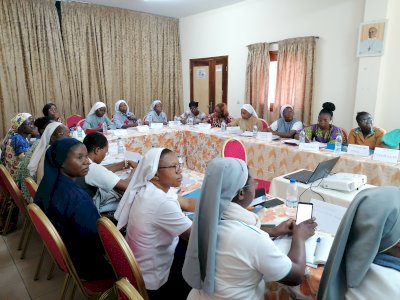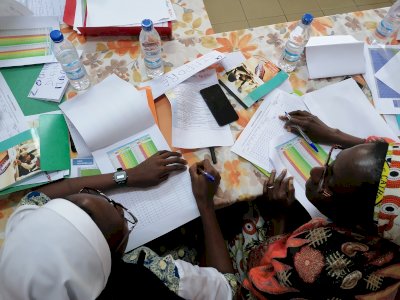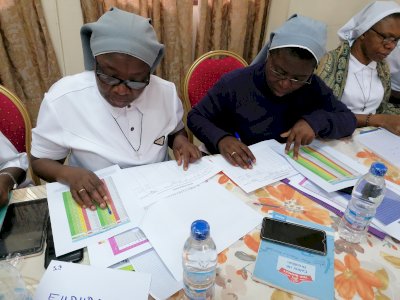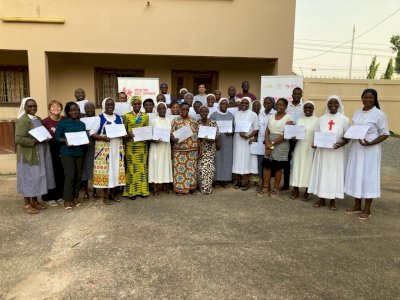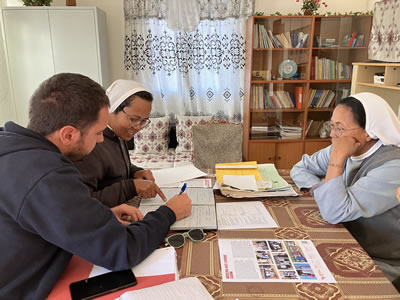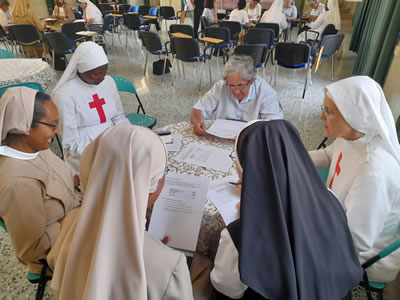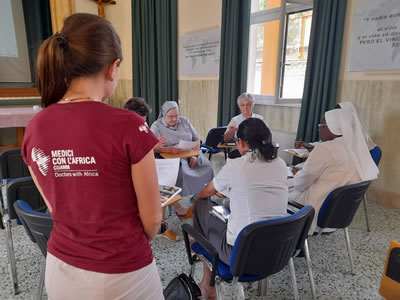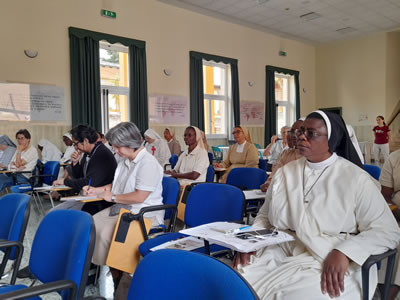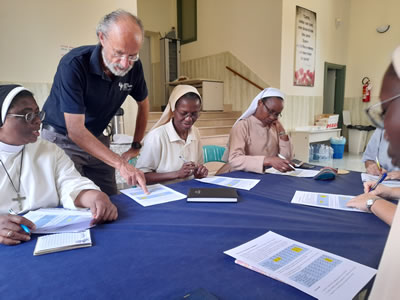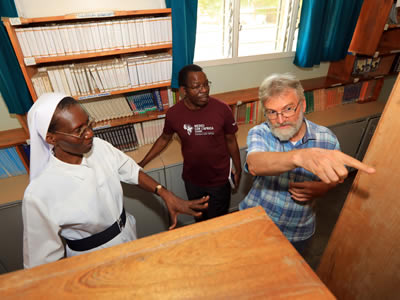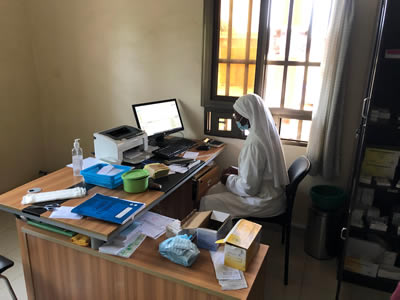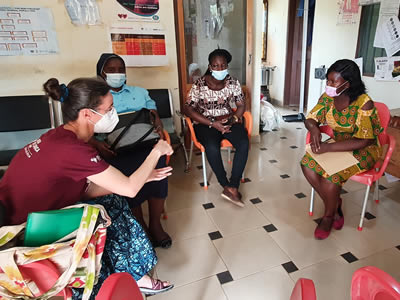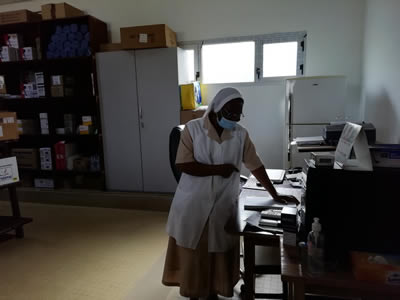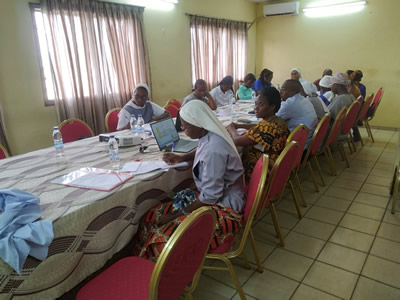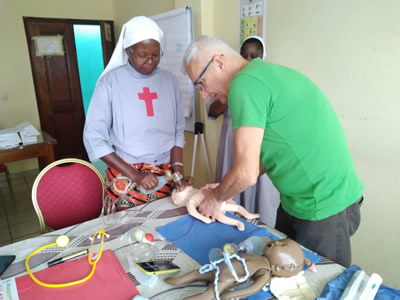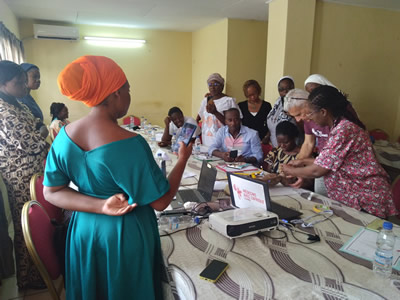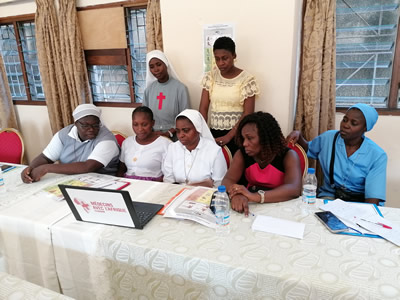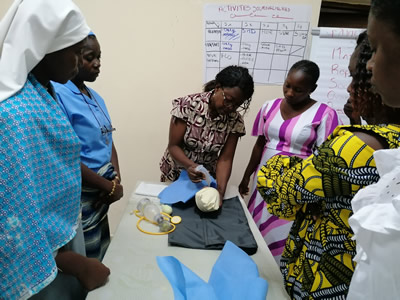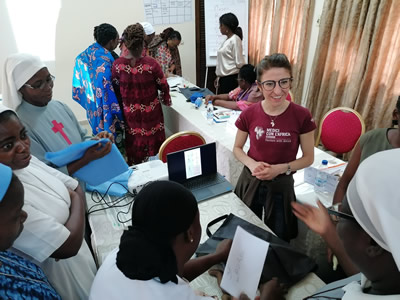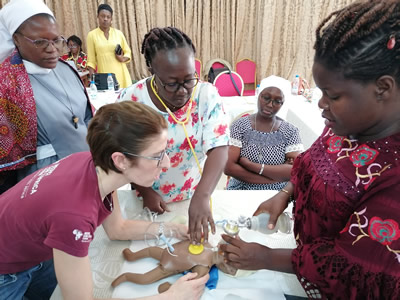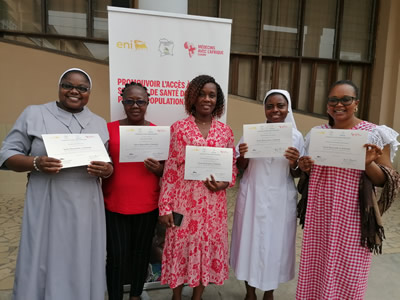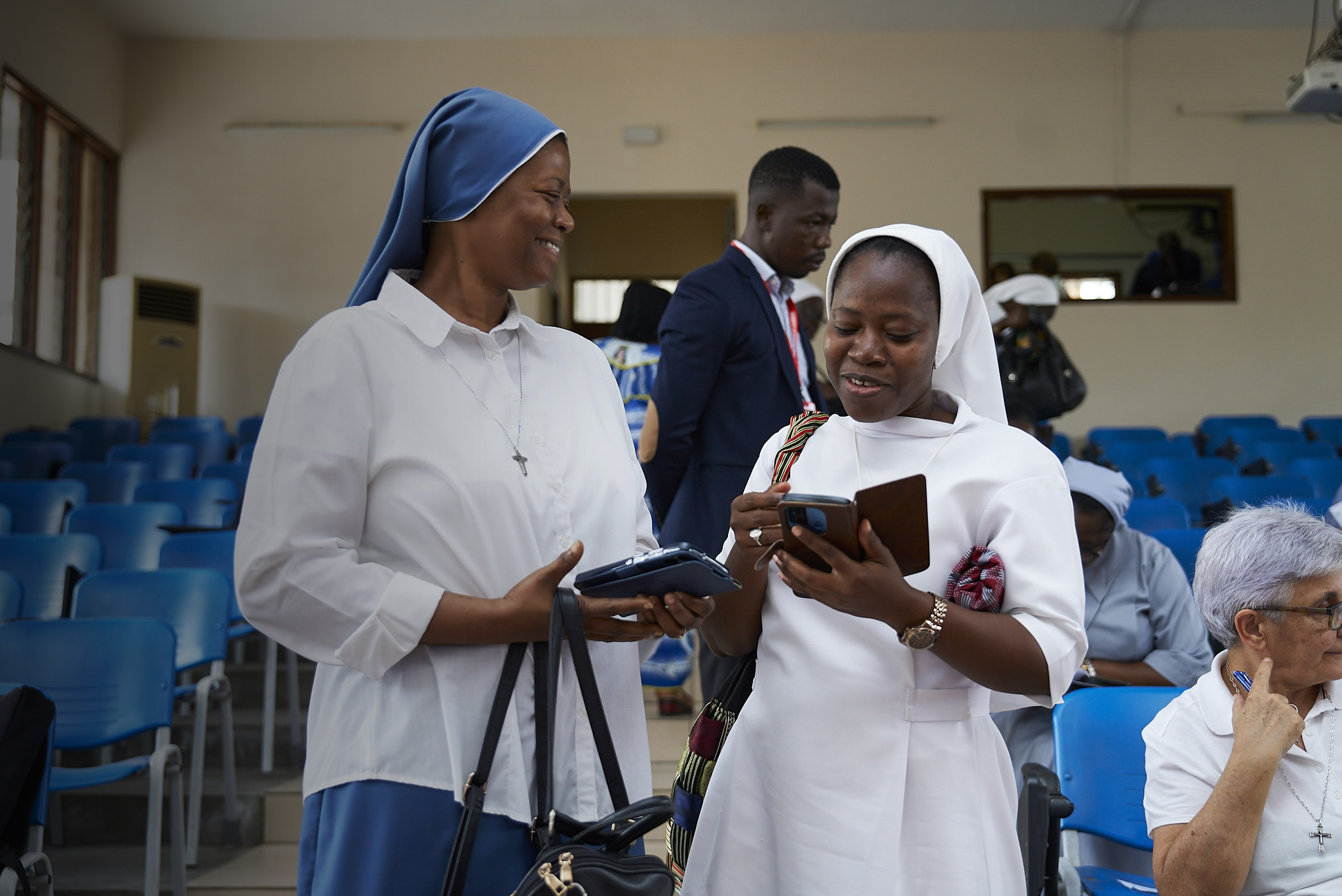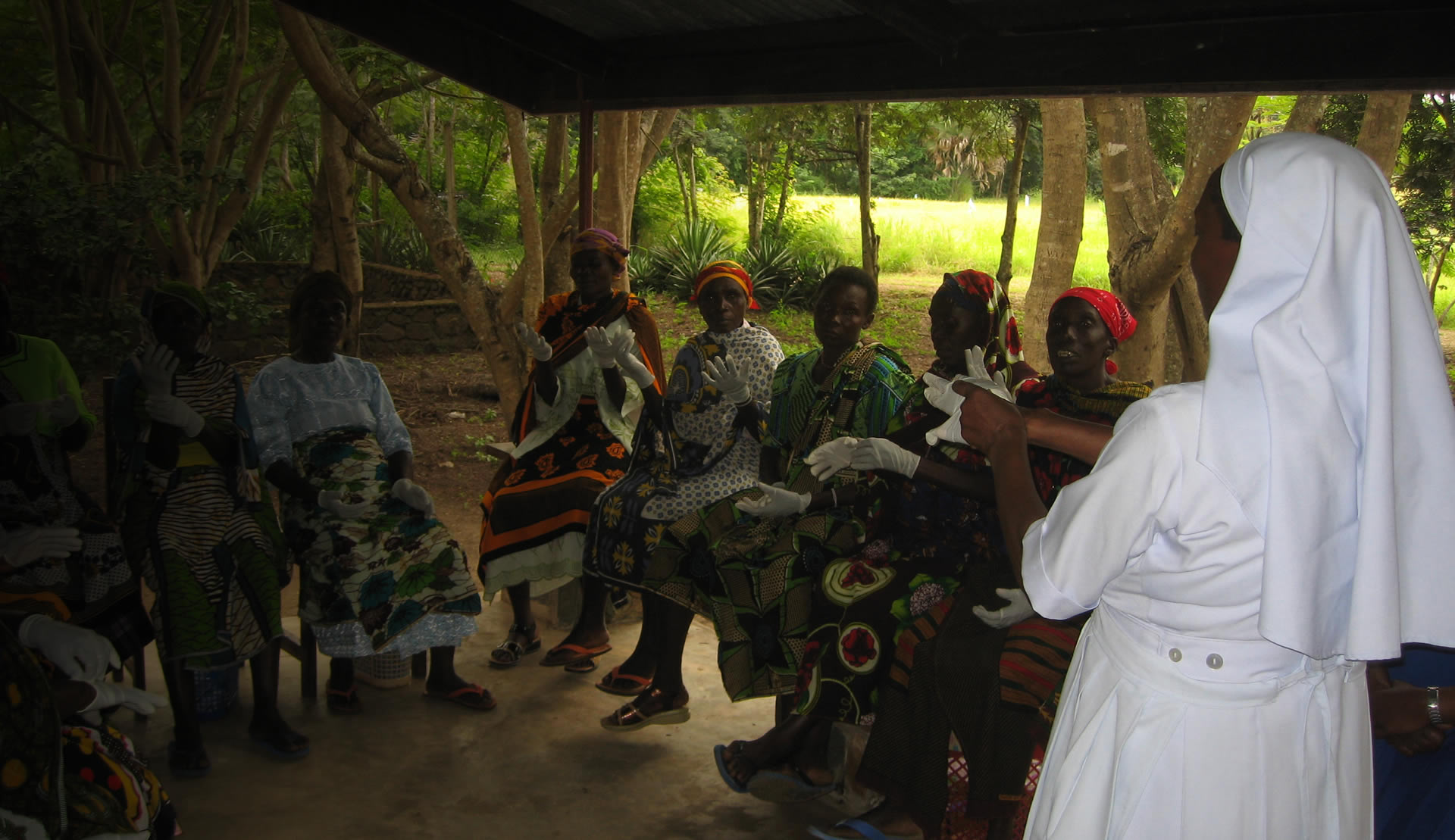TRAINING
Training and capacity building of local health staff working in the last mile has been at the core of CUAMM’s mission since its foundation in 1950. It is crucial to increase competencies useful to be able to work in low-resource settings and provide primary healthcare at all levels of the local health system.
To strengthen the capacity of FBOs delivering health care services in Africa, CUAMM develops and provides training packages on different topics including healthcare facilities management, clinical aspects, project management, disaster preparedness and resource mobilization.
CUAMM directly engages the beneficiary of the trainings to understand their needs and develop training packages tailored to their context. Courses are provided both online and in-person and training are offered in different languages (e.g. English, Italian, French).
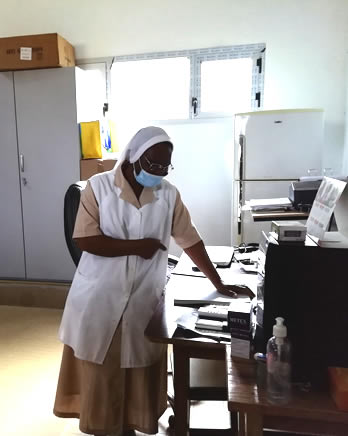
“I took part in the course and it has been useful for me because it allowed me to learn things I did not know and it helped me. I liked the training sessions focusing on the skills that I can immediately put into practice, such as better management of the register of expenses and budget planning”.
Sister Gwladys – Daughters of the Sacred Heart of Jesus
HEALTHCARE FACILITIES MANAGEMENT
The training provides key insights into the management of health facilities in Africa.
TRAINING PROGRAMME
- Introduction to the essential concepts of African health systems.
- Hints on funding, human resources and data collection.
- Management of wards.
- Management of emergencies.
- Administration and accounting in hospitals and health facilities in Africa
- The project cycle, the project budget and related management.
- Donors and fundraising projects.
- Real cases presentation: challenges and best practices related to administration and accounting encountered by the FBOs.
JUST IN TIME IN LOW RESOURCE SETTINGS
The training boosts disaster preparedness among health workers in low-resource settings
TRAINING PROGRAMME
- Introduction to essential disaster knowledge.
- Basic principles of disaster medicine and public health emergencies.
- Understand how to work proficiently and safely work in any healthcare facility during any disasters.
- Comprehend the working principles and the standard operating procedures in preparation for, during or in the aftermath of a disaster.
- Real cases presentation: challenges and best practices related to emergency response.
STRATEGIC THINKING AND DECISION-MAKING
This workshop provides FBOs’ leaderships with key insights for taking strategic and sustainable decisions
TRAINING PROGRAMME
- Catholic Church’s approach to global health
- Strategic thinking and decision-making processes from a sustainability perspective
- Managing relations with local health authorities
- Case studies of hospital management with teamwork
RESOURCE MOBILIZATION AND PROJECT FINANCING CYCLE
Training on the essential aspects of effective project financial management and resource mobilization for healthcare delivery in low-resource settings.
TRAINING PROGRAMME
- Donor differences and funding opportunities for healthcare projects.
- Techniques for identifying, selecting and engaging potential donors.
- Building and maintaining donor relationships for developing structured health programs with sustainable impact.
- Essential elements for developing a long-term fundraising strategy and avoiding resource shortfalls.
- Fundamental elements of a healthcare project life cycle.
- Leveraging partners for effective collaborations.
- Identifying health needs and challenges.
- Crafting clear project proposals and ensuring project sustainability.
- Developing targeted communication strategies.
- Budgeting and resource planning.
WORKSHOP ON PROJECT MANAGEMENT, MONITORING AND EVALUATION
Workshop on the essential elements of health planning, project management and monitoring, introducing health cooperation projects in the context of local health systems.
TRAINING PROGRAMME
- Working by projects and objectives in health cooperation
- Assessment, planning and implementing health cooperation projects
- Monitoring and evaluation of the projects
MALNUTRITION MANAGEMENT
The training provides healthcare personnel with the fundamentals of malnutrition management, from initial screening to follow-up care, through an analysis of 10 key points.
TRAINING PROGRAMME
- Basics of nutrition.
- Importance of breastfeeding and complementary feeding.
- Pathophysiology and consequences of acute malnutrition.
- Identification of acute malnutrition.
- Nutritional treatment.
- Medical complications: hypoglycaemia, hypothermia, dehydration.
- Medical complications: infections.
- Monitoring malnourished children.
- Promoting neurocognitive development.
- Management, supervision, training.
MATERNAL CHILD HEALTH
The training provides healthcare personnel with the fundamentals of maternal child health in essential care, reanimation and neonatal stabilisation.
TRAINING PROGRAMME
- Basics of neonatal care.
- Recognition and assessment of the sick child.
- Importance of monitoring and documentation of vital signs.
- Choice and evaluation of appropriate feeding method.
- Assessment of respiratory function.
- Preventing and minimising the risk of infection.
- Importance of good hygiene for the child.
LEADERSHIP AND NETWORKING SKILLS
The training provides leadership skills to improve networking in health cooperation projects between Religious Congregations, governmental institutions and international stakeholders.
The training is now also available in French.
TRAINING PROGRAMME
- Connect, strengthen and empower Faith-Based Organisations in delivering healthcare services.
- Supporting Faith-Based Organizations delivering Healthcare in Africa.
- Partnerships with Governments & Local Authorities: the experience of the Uganda Catholic Medical Bureau (UCMB)
FORECASTING DRUGS AND SUPPLIES, PROCUREMENT AND DISTRIBUTION
This training equips healthcare facility managers with the necessary knowledge and skills to develop
effective supply plans, efficiently manage stock levels, and accurately estimate the needs of healthcare
facilities.
TRAINING PROGRAMME
- Logistics system for medical products
- Quantification and procurement
- Stock management and storage
- Distribution and dispensing
- Management tools and systems
INFECTION PREVENTION AND CONTROL (IPC)
This training strengthens healthcare professionals’ skills in infection prevention and control measures. It
provides essential knowledge to enhance patient safety and healthcare quality.
TRAINING PROGRAMME
- Communication, Collaboration, and Teamwork
- Introduction to Infection Prevention and Control
- Hand Hygiene
- Respiratory Hygiene
- Facility Cleaning in Healthcare Settings
- Processing of Reusable Medical Devices
- Healthcare Waste Management
- Injection Safety
- Multimodal Strategy
- Practical Sessions
VOICES FROM THE FIELD
This project is being carried thanks to the support of:


